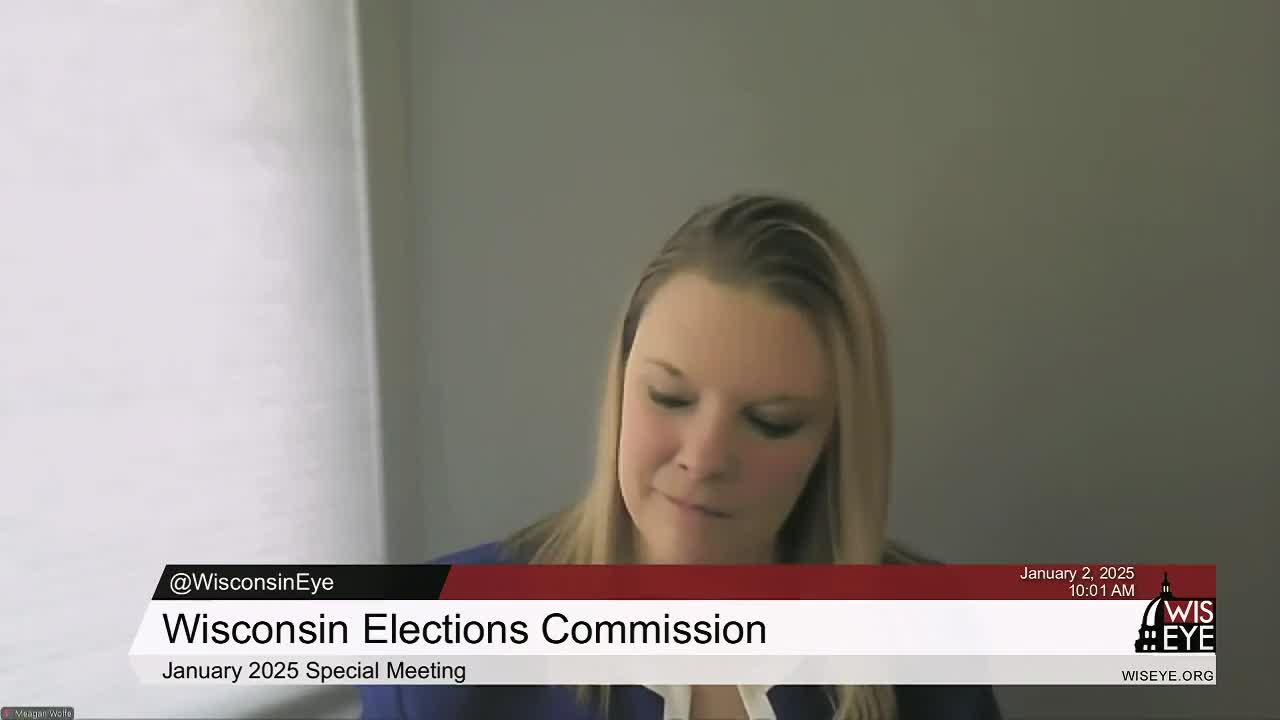Wisconsin Elections Commission authorizes investigation into Madison’s 193 uncounted absentee ballots
Get AI-powered insights, summaries, and transcripts
Subscribe
Summary
The Wisconsin Elections Commission voted to authorize an investigation under Wisconsin Statute 5.06(4) into how the City of Madison handled 193 absentee ballots not processed in the Nov. 5, 2024 general election.
The Wisconsin Elections Commission voted to authorize an investigation under Wisconsin Statute 5.06(4) into the City of Madison clerk’s handling of 193 absentee ballots that staff say were not processed during the Nov. 5, 2024 general election.
Chair Jacobs opened the item saying the meeting was called to determine whether the commission had authority to investigate and to understand "why those ballots weren't accounted for and weren't included in our canvas." Attorney Sharp told commissioners commission staff had independently verified that the uncounted absentee ballots did not change the outcome of any federal, state or local race on the affected ballots.
The staff timeline presented to the commission shows the Madison clerk’s office first contacted commission staff Dec. 18 to request help entering reconciliation data into the statewide voter registration system. Commission staff then requested a call with the Madison clerk and city attorney; a detailed statement from Clerk Whitselbel was provided to commission staff on Dec. 23, and Madison issued a public press release Dec. 26, the materials show. Attorney Sharp said the memorandum and appendices contain the sum total of what commission staff have identified to date.
Attorney Sharp summarized the legal authority that would allow the commission to investigate on its own motion, quoting Wis. Stat. 5.06(4) and explaining that the commission may, after an investigation, issue orders requiring an election official to conform to the law or correct actions inconsistent with the law. Sharp said the investigatory order would be the same form of order the commission issues to resolve a 5.06 complaint.
Commissioners debated whether to wait for an outside complaint. Commissioner Millis, Commissioner Bostelman and others said the goal should be timely fact-gathering and producing guidance to prevent similar errors, particularly with elections scheduled in February and April. Commissioner Spindel emphasized concerns about precedent and scope, and at one point attempted to amend the motion to add an investigation of the City of Milwaukee central count; Chair Jacobs ruled that amendment out of order because the meeting notice covered only Madison.
Commissioner Repel moved the staff’s recommended motion (option 1) authorizing an investigation; Commissioner Bostelman seconded. The commission voted orally and the motion passed. Chair Jacobs said she and Commissioner Millis would work with staff to prepare the investigatory questions in proper form and stated a goal to issue requests to the clerk’s office promptly so the commission could share transparent information with the public and advise clerks statewide.
The vote authorizes staff to pursue the investigatory process outlined in the staff memorandum and to collect records and statements relevant to the 193 uncounted absentee ballots. Attorney Sharp and staff noted the stated purpose is to create a complete record of what transpired so Madison can implement improved policies and other clerks can learn how to avoid similar issues.
Commissioners and staff repeatedly emphasized that the independent review is intended to identify procedural weaknesses and produce guidance, not primarily to punish. Chair Jacobs also cautioned that the commission could only examine matters for which it had been properly noticed at this meeting.
The commission did not adopt any punitive order at the meeting; it authorized the investigative process and directed staff to draft requests and take steps to produce a transparent record.
